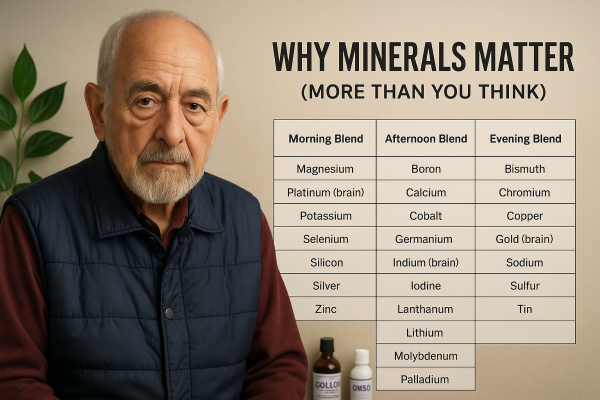Let’s have a sit-down talk about minerals, shall we? If you’re still wandering around thinking your daily apple or bowl of broccoli is giving you everything your body needs, I hate to break it to you, but you’ve been duped. You see, the fruits and veggies that line our grocery store shelves today are a far cry from the mineral-rich produce our great-grandparents used to pull from the earth. They look pretty, sure, but it’s all costume and no character. It’s not what’s in them that counts anymore, it’s what’s missing.
Once upon a time, we got our minerals from the soil. The rain would fall, the worms would wiggle, and the Earth would do its dance, creating food that nourished every cell in our body. But modern agriculture has stripped our soil of its lifeblood. Most farms today fertilize with just the big three: nitrogen, phosphorus, and potassium, enough to make a tomato look like a tomato, but not enough to make it act like one inside your body.
Dr. Joel Wallach, who I consider one of the true mineral prophets of our time, discovered something that shook the tree: animals that die of so-called “natural causes” were all severely mineral deficient. He proved this wasn’t just true for goats and guinea pigs; it applied to us two-legged folks, too.
You may not be starving, but your body is likely screaming for minerals. They’re the cofactors, the spark plugs, the tiny gears that keep your cellular engines humming. Without them, your body is like a fancy sports car with no oil. You might get a few revs in, but that engine’s going to seize up before long.
So what do you do? You supplement, not with a multivitamin horse pill made in a chemical lab, but with clean, intelligently timed mineral intake that your body can actually use.
But Timing, My Friend, Is Everything
You can’t just throw back a bucket of minerals and expect your body to sort it out. Nature doesn’t work that way. You see, minerals are like rival siblings at the dinner table; they’ll fight each other for attention.
Take iodine and fluoride. They’re both halogens, but your body’s going to reach for the lighter one first: fluoride. Problem is, fluoride does more damage than good, and if it gets picked up, iodine (which your thyroid desperately needs) gets benched.
Same story with copper and zinc. Too close in size and shape, and your body gets confused. Zinc has a slight edge; it’s heavier with one more electron, so it hogs the receptors if they show up together.
That’s why you space them out. Give each set of minerals its own spotlight so your body can soak them up properly, with no interference.
Here’s a Simple Mineral Timing Chart That Works
| Morning Blend | Afternoon Blend | Evening Blend |
| Magnesium | Boron | Bismuth |
| Platinum (brain) | Calcium | Chromium |
| Potassium | Cobalt | Copper |
| Selenium | Germanium | Gold (brain) |
| Silicon | Indium (brain) | Sodium |
| Silver | Iodine | Sulfur |
| Zinc | Iron | Tin |
| Lanthanum | ||
| Lithium | ||
| Molybdenum | ||
| Palladium | ||
| Zinc (if skipped earlier) |
Note: Some minerals, like zinc, are listed in more than one column because folks vary. If you take zinc in the morning, skip it in the afternoon. Don’t double-dip unless advised.
How to Take Your Minerals
- Always with water, filtered, mineral-enhanced, or structured water is best. Avoid chlorinated tap water when possible; it messes with absorption.
- No mega-doses. You’re not trying to shock your body; you’re trying to feed it.
- Consistency over quantity. Daily, low-dose, high-quality minerals are far better than occasional mineral “bombs.”
- Oral sprays and ionic liquid minerals absorb faster than pills.
- Topical magnesium (as oil or lotion) works wonders; your skin will drink it up.
Don’t Wait Until You’re Crumbling
People will spend a fortune fixing what could’ve been prevented for pennies. Your body is a mineral machine; feed it right, and it’ll reward you with energy, clarity, strong bones, a better mood, and a longer, more vibrant life.
Think of mineral supplementation like brushing your teeth; it’s not a cure; it’s a habit. One that, if you stick with it, might just make the difference between a slow decline and a graceful glide into your elder years.
So here’s your homework:
Get smart about your minerals. Time them right. Watch your body respond.
The soil may be empty, but you don’t have to be.
— Herb Roi Richards
